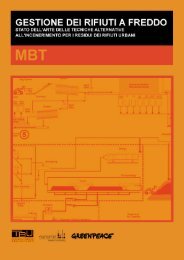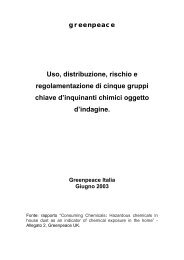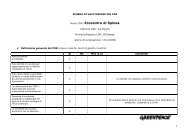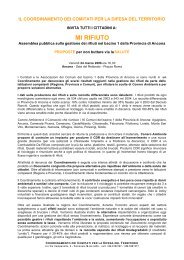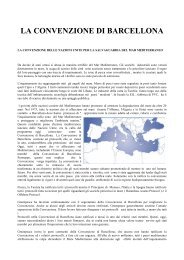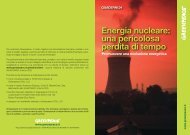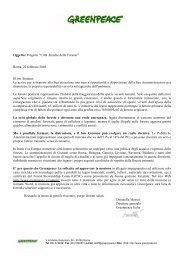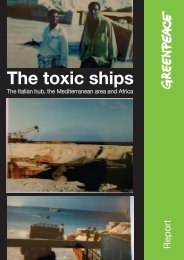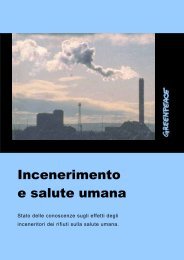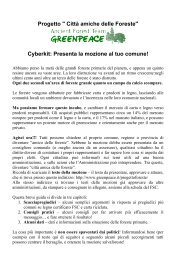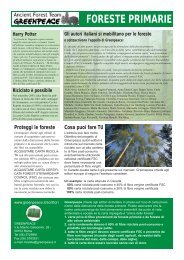Zero Waste by Robin Murray, Greenpeace Environmental Trust 2002
Zero Waste by Robin Murray, Greenpeace Environmental Trust 2002
Zero Waste by Robin Murray, Greenpeace Environmental Trust 2002
Create successful ePaper yourself
Turn your PDF publications into a flip-book with our unique Google optimized e-Paper software.
municipal sector. The eco-efficiency literature is full of<br />
examples of firms cutting waste and toxic emissions <strong>by</strong><br />
orders of magnitude. 47<br />
Eco-efficiency and innovation<br />
In its early phases of application, eco-efficiency is applied<br />
to on-site processes and later to products. 48 This has led to<br />
the criticism that eco-efficiency merely provides a<br />
‘greenwash’ to the existing industrial system. Running a<br />
chlorine factory with fewer emissions cannot obscure the<br />
fact that chlorine-based products are major sources of<br />
pollution as they pass down the chain. Or to take a recent<br />
British example, one of the UK incinerators was recently<br />
awarded the ISO 140l standard for environmental<br />
performance at the very time when it was mixing its<br />
highly dioxinated fly and bottom ash, storing it in the<br />
open air and allowing it to be used in urban domestic<br />
construction projects as a means of waste reduction.<br />
Were eco-efficiency to remain limited in this way, the<br />
criticism would be well founded. Yet when a new way of<br />
looking at production and product design comes into play,<br />
with new touchstones and sensitivities, it is impossible to<br />
confine the approach to the role of propping up old<br />
production. For a fresh paradigm of this sort opens up<br />
whole unexplored territories for development – for<br />
technology, for products and for ‘productive systems’,<br />
similar in many ways to those created <strong>by</strong> electronics. As<br />
with electronics, the industrial firms that fail to respond to<br />
the new opportunities will be sidelined <strong>by</strong> the firms that<br />
do. By the end of the 1990s environmental performance<br />
had become recognised as a key element of the new<br />
competition.<br />
Clean Production<br />
Clean production is one way in which eco-efficiency has<br />
moved beyond the old. The WBCSD guideline ‘reduce<br />
toxic dispersion’ is the weakest formulation of the seven<br />
and reflects the vigour with which some branches of the<br />
chemical industry have defended their products in spite of<br />
their prevalent toxicity. 49 Yet the pressure to develop green<br />
chemicals and alternative non-toxic products has been<br />
intense and increasingly successful. <strong>Environmental</strong><br />
pressure has forced the phasing out of toxic products such<br />
as DDT, leaded petrol, CFCs and halons, and the<br />
Stockholm Convention on Persistent Organic Pollutants<br />
will now target a further twelve organochlorines.<br />
At the same time new products have been developed – as<br />
alternatives to banned and threatened substances<br />
(examples would be wet cleaning as an alternative to dry<br />
cleaning, plant-based inks and dyes, lead-free paint, as<br />
well as the remarkable rise of organic and till free<br />
agriculture). While the Stockholm Convention covers only<br />
twelve out of the 70,000 chemicals now in use, this should<br />
not diminish its importance. It lays down a marker for<br />
greener production. It shows a readiness to phase out<br />
toxic materials whatever their economic significance, and<br />
it means the eyes of the world now have the full range of<br />
chemicals in their sights.<br />
The commodity-service economy<br />
A second area that is being transformed is that of durable<br />
goods. In many of the durable sectors waste has been<br />
handled beneath the managerial radar line, since the cost<br />
of disposal has been minimal. The introduction of<br />
producer responsibility legislation, and demands for<br />
increased recycling and resource efficiency, are changing<br />
this. Firms are being forced to re-assess their products<br />
from the viewpoint of product life and recyclability. A<br />
new ‘durable’ industrial paradigm is emerging as a result,<br />
variously described as de-materialisation, the access<br />
economy, and the ‘servicising’ economy. Each of these<br />
formulations points to the increasing significance of<br />
knowledge-based services to modern production and the<br />
declining economic significance of material products.<br />
One of those closest to these changes is Walter Stahel, of<br />
the Product Life Institute in Geneva. He and his colleagues<br />
72<br />
<strong>Zero</strong> <strong>Waste</strong><br />
73



